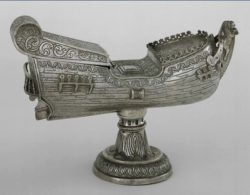
The navicula— a silver incense boat modeled after the oceangoing ships that brought early explorers to new lands around the globe—will be the focus of the Norman L. and Roselea J. Goldberg Lecture in Art History Thursday, April 13.
Jeffrey Collins, a specialist in 17th- and 18th-century art and culture at Bard Graduate Center, will discuss “Ship Shape: Incense Boats Across the Early Modern Globe” at 4:10 p.m. The lecture will be in Cohen Memorial Hall, Room 203, with a reception afterward in the atrium.
Beginning in the late 15th century, the spread of European merchants and missionaries in pursuit of new territory was accompanied by an unprecedented tide of Western material culture, including objects and implements associated with Catholic Christianity. The silver navicula was among the most striking items, according to Collins.
“Encoding movement and exchange in their very form, and housing fragrant resins that were both a tool of evangelization and an international commodity, naviculas embody the spread of commerce and Christianity and suggest important links between the two,” Collins said. “My lecture will investigate the development and worldwide dispersal of this distinctive ship-shaped form during the heyday of exploration and colonization, including its links to secular table vessels known as nefs. Just as important, more detailed study of specific examples from the Americas, Africa and Asia suggests how seemingly ubiquitous and globalized objects may nonetheless have carried distinct and specific local meanings for the individuals and communities that made, used or viewed them.”
Collins is an internationally respected specialist in the art, architecture and visual culture of the global early modern era, with an emphasis on Italian art and museology of the 18th century. He is the author of Papacy and Politics in Eighteenth-Century Rome: Pius VI and the Arts (Cambridge University Press, 2004) and the principal contributor to History of Design: Decorative Arts and Material Culture 1400-2000 (Yale University Press, 2013). His Goldberg lecture is part of a larger book project titled The Global Republic of Sacred Things: The Circulation of Religious Art in the Early Modern World.
Collins’ teaching interests include 17th- and 18th-century France, colonial Latin America, and the commemorative monument.
Sponsored by the Department of History of Art, the Goldberg Lecture is free and open to the public. Parking is available in Lot 95 outside of Cohen Hall. For more information, call the department at 615-322-2831.
Fay Renardson contributed to this story.